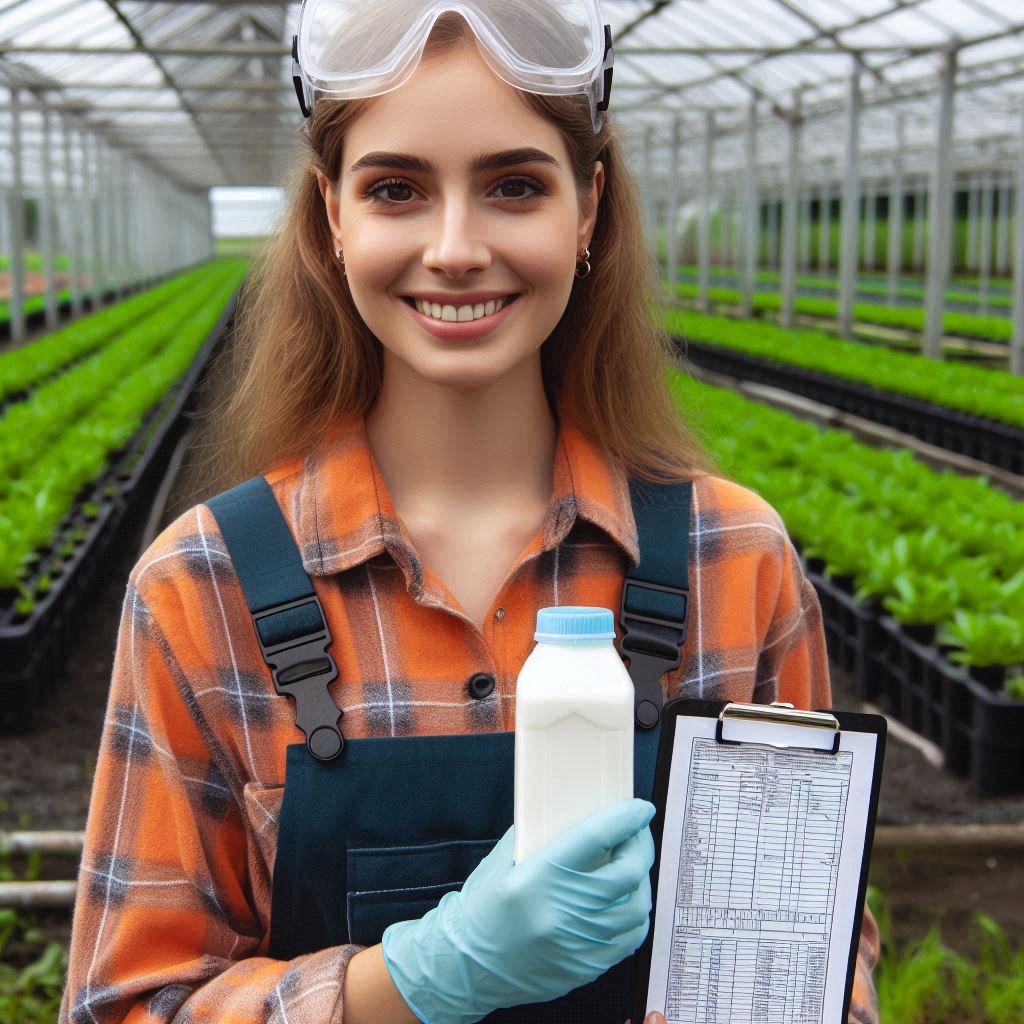Introduction
Food safety is essential for safeguarding public health and ensuring the quality of our food supply.
It encompasses measures to prevent foodborne illnesses and maintain high standards throughout the food production process.
Agricultural engineers play a crucial role in achieving these objectives by applying their expertise to various aspects of food safety.
Agricultural engineers work on designing and optimizing systems to prevent contamination at every stage of food production.
They develop technologies that improve food processing methods, ensuring that food is handled safely from farm to table.
This involves creating advanced systems for cleaning, sanitizing, and processing agricultural products.
One of their key responsibilities is to enhance storage and transportation systems.
Agricultural engineers design refrigeration and packaging solutions that extend the shelf life of perishable goods and protect them from contamination during transit.
By improving these systems, they help maintain the safety and quality of food products throughout the supply chain.
Additionally, agricultural engineers contribute to developing and implementing best practices for handling food in various settings, including farms, processing facilities, and distribution centers.
Their work ensures that food safety regulations are met and that potential risks are minimized.
They also play a role in educating industry professionals about food safety standards and procedures.
Educational background and training of agricultural engineers
Specific Skills and Knowledge Required
Agricultural engineers play a crucial role in ensuring food safety.
Their work involves specific skills and knowledge tailored to this field. First, a strong foundation in engineering principles is essential.
Agricultural engineers apply mechanical, civil, and chemical engineering concepts to design and improve food production systems.
They need expertise in developing and maintaining equipment that meets safety standards.
Knowledge of food safety regulations and standards is also critical.
Agricultural engineers must understand laws related to food processing, handling, and storage.
They need to ensure that systems and processes comply with these regulations to prevent contamination and ensure consumer safety.
Familiarity with hazard analysis and critical control points (HACCP) is important for identifying and mitigating risks in food production.
Technical skills in data analysis are valuable. Agricultural engineers often analyze data to monitor and improve food safety processes.
They use this data to optimize systems and ensure they operate efficiently and safely.
Proficiency in using software tools for simulation and modeling helps in designing safe and effective food production systems.
Experience with quality control and assurance processes is essential.
Agricultural engineers develop and implement protocols for testing and ensuring the quality of food products.
They work on designing systems that maintain proper hygiene and sanitation throughout the production cycle.
This involves regular inspections and adjustments to ensure adherence to safety standards.
Importance of Ongoing Education and Professional Development
Ongoing education and professional development are vital for agricultural engineers focused on food safety.
The field of food safety is continually evolving with new technologies and regulations.
Staying current with these changes requires a commitment to lifelong learning.
Agricultural engineers should engage in continuing education to keep their skills and knowledge up to date.
Participating in workshops, seminars, and conferences provides valuable opportunities for learning about the latest advancements in food safety.
These events offer insights into emerging technologies, best practices, and regulatory updates.
Networking with other professionals at these events can also lead to new ideas and collaborations that enhance food safety practices.
Certifications and specialized training programs can further enhance an agricultural engineer‘s expertise.
Pursuing certifications related to food safety management, quality assurance, or specific engineering technologies demonstrates a commitment to professional growth.
These credentials not only enhance your skills but also improve your credibility in the field.
In addition, engaging with professional organizations and industry groups provides access to resources and support.
Membership in such organizations can offer valuable information on new research, technologies, and trends in food safety.
Being active in these communities helps in staying informed and connected with industry developments.
Read: Decoding the Ethics & Responsibilities of US Civil Engineers
Development of agricultural machinery and equipment
Agricultural engineers play a critical role in designing and improving machinery and equipment for food production.
Through their expertise and knowledge, they contribute to ensuring food safety and quality in the agricultural sector.
Designing and Improving Equipment for Food Production
- Agricultural engineers are responsible for designing and creating machinery that helps streamline various processes involved in food production. This includes planting, harvesting, and packaging crops efficiently.
- These engineers work closely with farmers and food manufacturers to understand their needs and challenges. They then develop innovative solutions to address these challenges and improve overall food safety.
- By designing equipment that is specifically tailored to the needs of food production, agricultural engineers help reduce the risk of contamination and ensure the efficient handling of crops and livestock.
- Agricultural engineers also focus on optimizing the use of resources such as water, soil, and energy in food production. This not only improves sustainability but also enhances food safety by minimizing the impact of harmful chemicals or pollutants.
Impact of Technological Advancements on Food Safety
- Technological advancements have revolutionized the agricultural sector, leading to significant improvements in food safety. Agricultural engineers leverage these advancements to develop cutting-edge equipment and processes.
- With the use of technologies such as sensors, drones, and automation, agricultural engineers can monitor crops and livestock more effectively. This real-time data helps in identifying potential risks and implementing preventive measures promptly.
- Precision agriculture, a concept driven by technological innovations, allows agricultural engineers to customize farming practices based on specific requirements. This level of precision enhances food safety by ensuring that resources are used efficiently and sustainably.
- The integration of data analytics and artificial intelligence in agriculture enables agricultural engineers to predict and prevent potential issues related to food safety. These tools help in identifying patterns and trends that could pose risks to food production.
Basically, the role of agricultural engineers in designing and improving equipment for food production is indispensable.
Their efforts not only enhance the efficiency of food production but also contribute significantly to ensuring food safety.
By leveraging technological advancements, agricultural engineers continue to innovate and develop solutions that promote a sustainable and safe food supply for consumers.
Read: From Intern to Lead: Climbing the Software Ladder in the US
Implementation of safety protocols and regulations
How Agricultural Engineers Help Develop and Enforce Safety Standards
Agricultural engineers play a vital role in developing and enforcing safety standards in food production.
They work on designing systems that prevent contamination and ensure the safety of food products.
Engineers create protocols for handling, processing, and storing food, adhering to established safety standards.
They collaborate with regulatory agencies to develop safety guidelines.
By integrating their engineering expertise, they help shape regulations that protect consumers.
Engineers also design and implement monitoring systems that track compliance with safety standards.
These systems ensure that food production processes remain within safe parameters.
In designing equipment and facilities, agricultural engineers prioritize hygiene and safety.
They use materials and designs that prevent contamination and are easy to clean.
For example, they ensure that machinery used in food processing has proper sanitation features to minimize the risk of foodborne illnesses.
Agricultural engineers also conduct regular inspections and audits.
These activities assess the effectiveness of safety measures and identify areas for improvement.
By evaluating systems and processes, they help enforce safety standards and ensure that food production remains compliant with regulations.
Importance of Following Regulations in Preventing Food Contamination
Following regulations is crucial in preventing food contamination.
Food safety regulations establish protocols that minimize the risk of contamination during production, handling, and storage.
Adhering to these regulations helps protect consumers from foodborne illnesses and ensures the quality of food products.
Compliance with safety regulations involves implementing measures such as proper sanitation, temperature control, and equipment maintenance.
Regulations often specify how to clean and sanitize equipment, how to store food safely, and how to monitor processes.
Following these guidelines prevents contamination and maintains the integrity of the food supply.
Agricultural engineers play a key role in ensuring that these regulations are effectively implemented.
They design systems and processes that facilitate compliance with safety standards.
Their expertise in engineering solutions helps maintain high safety levels in food production environments.
Transform Your Career Today
Unlock a personalized career strategy that drives real results. Get tailored advice and a roadmap designed just for you.
Start NowNon-compliance with safety regulations can lead to serious consequences.
It can result in foodborne illnesses, product recalls, and legal issues.
Therefore, strict adherence to regulations is essential for preventing contamination and protecting public health.
Agricultural engineers help enforce these standards to mitigate risks and ensure that food products are safe for consumption.
In addition to preventing contamination, following regulations helps build consumer trust.
When food production processes comply with safety standards, consumers have confidence in the products they purchase.
This trust is vital for maintaining a positive reputation and ensuring the success of food-related businesses.
Read: The Role of NCARB in US Architecture Licensing.
Monitoring and inspection of food production processes
How Agricultural Engineers Conduct Regular Inspections to Ensure Food Safety
Agricultural engineers conduct regular inspections to ensure food safety throughout the production process.
They start by assessing equipment and facilities for compliance with safety standards.
Engineers check that all machinery is properly sanitized and functioning correctly.
They examine production lines to ensure they are free from contaminants and meet hygiene requirements.
During inspections, engineers evaluate the effectiveness of safety protocols.
They review procedures for handling and storing food to confirm adherence to safety guidelines.
By inspecting storage conditions, they ensure that food is kept at the correct temperatures to prevent spoilage and contamination.
Engineers also inspect waste management systems to ensure proper disposal of food waste.
They verify that waste is managed in a way that does not pose a contamination risk.
Regular inspections of these systems help maintain a clean and safe production environment.
Furthermore, agricultural engineers assess employee practices during inspections.
They ensure that staff follow proper hygiene practices, such as wearing protective clothing and washing hands.
By observing and correcting any deviations from safety procedures, engineers help maintain high standards of food safety.
Role of Data Analysis and Quality Control in Identifying Potential Risks
Data analysis and quality control are crucial in identifying potential risks in food safety.
Agricultural engineers use data from various sources to monitor food production processes.
They analyze data related to equipment performance, temperature controls, and sanitation practices.
This analysis helps identify patterns or anomalies that could indicate potential risks.
Engineers use statistical methods to assess the quality of food products.
They analyze samples for contaminants and check for deviations from quality standards.
This analysis helps detect problems early and prevent them from affecting larger batches of food.
Quality control measures involve regular testing and inspections of food products.
Engineers establish procedures for testing samples at different stages of production.
They ensure that testing protocols are followed and results are documented accurately.
Quality control helps in maintaining consistency and safety of food products.
Data analysis also supports the continuous improvement of safety measures.
Engineers use historical data to identify recurring issues and assess the effectiveness of safety protocols.
By evaluating past incidents and outcomes, they make informed decisions to enhance food safety practices.
Additionally, engineers implement automated monitoring systems that provide real-time data on production processes.
These systems alert engineers to deviations or potential issues, enabling prompt action to address risks.
Real-time data helps in maintaining a high level of vigilance and quickly responding to any safety concerns.
Read: Comparison: Architecture Styles across American Regions.

Collaboration with Other Professionals in the Food Industry
How Agricultural Engineers Work with Food Scientists, Producers, and Regulators to Improve Food Safety
Agricultural engineers collaborate with food scientists, producers, and regulators to enhance food safety.
Their combined efforts are crucial for developing effective safety protocols.
Engineers and food scientists work together to design systems that prevent contamination and ensure quality.
Food scientists provide expertise on the biological and chemical aspects of food safety, while engineers apply their technical skills to implement these solutions.
Engineers assist producers by developing and optimizing equipment and processes for safe food production.
They design and install systems that meet safety standards and help producers maintain compliance.
By working directly with producers, engineers address practical challenges and ensure that safety measures are effectively applied on the ground.
Collaboration with regulators is also essential.
Engineers help interpret and apply safety regulations to engineering solutions.
They ensure that their designs and processes comply with industry standards and legal requirements.
Regular consultations with regulatory bodies help keep practices up to date with the latest safety guidelines and technologies.
Engineers also participate in joint research initiatives with food scientists to explore new methods and technologies.
This research often leads to innovations in food safety practices and equipment.
By staying engaged with the latest developments, engineers and scientists work together to address emerging food safety challenges.
Importance of Teamwork and Communication in Addressing Food Safety Challenges
Teamwork and communication are critical in addressing food safety challenges effectively.
Agricultural engineers, food scientists, producers, and regulators must coordinate their efforts to ensure comprehensive safety measures.
Effective communication helps align goals and strategies, ensuring that all parties understand their roles and responsibilities.
Regular meetings and updates between team members facilitate the exchange of information and ideas.
This collaboration helps in identifying potential issues early and developing solutions quickly.
Engineers, for example, rely on feedback from food scientists and producers to refine their designs and processes.
Showcase Your Business Today
Reach thousands of readers actively exploring professional services. Publish your business profile and grow your audience now.
Publish NowClear communication channels also help in addressing unexpected problems.
When issues arise, quick and effective communication between team members allows for prompt resolution.
This responsiveness is crucial for maintaining safety and preventing contamination in food production.
Teamwork extends to training and education as well.
Engineers and food scientists often work together to train producers on new safety protocols and technologies.
This training ensures that all team members are informed about the latest practices and can implement them correctly.
Research and development in food safety
How agricultural engineers contribute to research projects focused on food safety
In the field of food safety, research and development play a crucial role in ensuring the quality and safety of our food supply.
Agricultural engineers contribute significantly to research projects that are focused on advancing food safety practices.
- One way agricultural engineers contribute is by developing new technologies and innovations that can help improve food safety measures.
- For example, engineers may work on projects that aim to enhance the detection of contaminants in food products, such as pathogens or chemicals.
- These advancements can lead to more effective monitoring and control of foodborne illnesses, ultimately protecting public health.
- By conducting experiments and trials, engineers can assess the efficacy of these new technologies in real-world scenarios.
Moreover, research in food safety also focuses on understanding the root causes of foodborne illnesses and finding ways to prevent them.
Agricultural engineers play a key role in developing and testing interventions that can reduce the risk of contamination along the food supply chain.
Potential impact of new technologies
- Engineers may collaborate with food scientists and microbiologists to study how pathogens spread in different environments, such as processing plants or farms.
- Based on their findings, engineers can design and implement control strategies to minimize the presence of harmful microorganisms in food products.
- These strategies may include the use of sanitation techniques, improved packaging, or novel processing methods that target specific pathogens.
- By investing in research and development, agricultural engineers contribute to continuous improvements in food safety standards and practices.
In essence, research and development in food safety are essential for ensuring the quality and safety of the food we consume.
Agricultural engineers play a critical role in advancing these efforts by developing innovative technologies and interventions that can mitigate risks and protect public health.
See Related Content: Salary Expectations for Agricultural Engineers
Crisis management and response in food safety emergencies
When it comes to crisis management and response in food safety emergencies, agricultural engineers play a crucial role in developing emergency response plans and implementing strategies to effectively address crises to prevent widespread contamination.
Role of Agricultural Engineers in Developing Emergency Response Plans
- Agricultural engineers assess potential risks and vulnerabilities in the food supply chain.
- They collaborate with food safety experts to develop comprehensive emergency response plans.
- Engineers design technology and infrastructure to support rapid response in case of emergencies.
- They conduct simulations and drills to test the effectiveness of emergency plans.
- Agricultural engineers analyze data to identify gaps and improve response procedures.
Strategies for Addressing Food Safety Crises
- Implementing stringent quality control measures throughout the production process.
- Enhancing traceability systems to track and recall contaminated products swiftly.
- Establishing communication protocols for effective coordination with stakeholders during emergencies.
- Conducting regular audits and inspections to ensure compliance with safety standards.
- Developing risk communication strategies to inform the public and prevent panic.
Essentially, agricultural engineers are instrumental in crisis management and response in food safety emergencies.
By developing emergency response plans and implementing effective strategies, they play a vital role in safeguarding public health and preventing widespread contamination.
Conclusion
Agricultural engineers play a crucial role in ensuring food safety and protecting public health.
They are involved in every stage of food production, from the field to the table.
Their expertise helps design and implement systems that enhance food safety and quality.
These engineers focus on developing and optimizing agricultural practices to prevent contamination.
They design advanced irrigation systems that ensure crops receive clean, uncontaminated water.
Additionally, they create and improve food storage facilities to maintain proper conditions and prevent spoilage.
Their work helps manage and monitor environmental factors that can affect food safety, such as temperature, humidity, and soil quality.
Agricultural engineers also work on implementing safety protocols and compliance measures.
They design systems that minimize the risk of foodborne pathogens and ensure adherence to safety standards.
By integrating the latest technologies and best practices, they help reduce the risk of contamination from field to processing facilities.
Moreover, agricultural engineers are involved in research and development to address emerging food safety challenges.
They develop innovative solutions to tackle issues related to pests, diseases, and environmental impacts.
Their research contributes to creating safer and more sustainable agricultural practices.
[E-Books for Sale]
The Big Book of 500 High-Paying Jobs in America: Unlock Your Earning Potential
$19.99 • 500 High-Paying Jobs • 330 pages
Explore 500 high-paying jobs in America and learn how to boost your career, earn more, and achieve success!
See All 500 High-Paying Jobs of this E-Book
1001 Professions Without a Degree: High-Paying American Jobs You Can Start Now
$19.99 • 1001 Professions Without a Degree • 174 pages
Discover 1001 high-paying jobs without a degree! Unlock career tips, skills, and success strategies for just $19.99!




